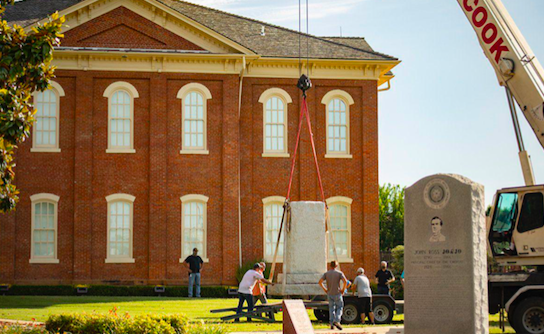
- Details
- By Native News Online Staff
TAHLEQUAH, Okla. — Following a nationwide wave to remove inappropriate statues and monuments tied to a messy racial past, the Cherokee Nation on Saturday removed two Confederate monuments near its tribal headquarters.
Cherokee Nation Principal Chief Chuck Hoskin, Jr., who decided it was time for the monuments to be removed, stood several feet away at the Cherokee Nation Capitol Square and watched as the two monuments were lifted by crane and put onto a truck.
“We’ve suffered for centuries with too many others telling our story for us as they see fit,” Chief Hoskin said. “It’s difficult to tell our story when we have non-Indian-driven monuments talking about the Confederacy, when they greet people as they come into our Cherokee Nation museum. It was time for a change.”
Both monuments were in place for over a century when the property was owned by the county. The Cherokee Nation reclaimed the property in 1979 and had nothing to do with their placements.
“There are some painful references on these monuments and I think we live in a time when we need to be mindful of the unity we have here on the courthouse Capitol Square. If there is one place in the Cherokee Nation that should stand for unity it should be here. After all, this is where we reconstituted our government and came back together as a people, and I think we need to do that today.”
A fountain memorializing Confederate soldiers and Confederate General Stand Watie was dedicated in 1913 by the Daughters of the Confederacy and was situated directly in the center of the capitol square.
A second granite monument weighing 13,000 pounds also honored General Watie, who was last to surrender during the Civil War. The monument was dedicated in 1921 by the same organization.
More Stories Like This
Native News Weekly (August 25, 2024): D.C. BriefsUS Presidents in Their Own Words Concerning American Indians
Navajo Man Faces Vehicular Homicide Charge After Child Killed at Navajo Nation Christmas Parade
Next on Native Bidaské: Lumbee Tribal Chairman John Lowery
Suspected Drunk Driver Crashes into Parade in Kayenta on Navajo Nation, Killing 1 & Injuring 3 Others
Help us defend tribal sovereignty.
At Native News Online, our mission is rooted in telling the stories that strengthen sovereignty and uplift Indigenous voices — not just at year’s end, but every single day.
Because of your generosity last year, we were able to keep our reporters on the ground in tribal communities, at national gatherings and in the halls of Congress — covering the issues that matter most to Indian Country: sovereignty, culture, education, health and economic opportunity.
That support sustained us through a tough year in 2025. Now, as we look to the year ahead, we need your help right now to ensure warrior journalism remains strong — reporting that defends tribal sovereignty, amplifies Native truth, and holds power accountable.
 The stakes couldn't be higher. Your support keeps Native voices heard, Native stories told and Native sovereignty defended.
The stakes couldn't be higher. Your support keeps Native voices heard, Native stories told and Native sovereignty defended.
Stand with Warrior Journalism today.
Levi Rickert (Potawatomi), Editor & Publisher

